News
Do you dream of emigrating away from the UK?
29 September 2016
Do you dream of heading away from these familiar shores and starting anew in a different part of the world? If you do, you are certainly not alone, as 51% of the 795 people that completed our recent travel survey, replied to the question ” would you like to emigrate away from the UK?” with either a ‘yes’ (27%) or a ‘not sure’ (24%)response. So, just under half of those surveyed were happy to continue living in the UK (49%), and didn’t envisage a happier and more fulfilling life elsewhere.
Post-Brexit Britain has certainly seen a surge in interest in moving elsewhere. Figures show that enquiries about moving over 9, 000 miles away to Australia rose by 118% following Britain’s vote to leave the EU in June. For those who wanted to stay in Europe, France was the most popular choice, with interest increasing by a massive 1507.14%. A poll on The Mirror newspaper website asking whether you are considering leaving Britain after the Brexit vote, indicated that 64% were, and only 36% weren’t.
There is still lots of confusion about the changes that may happen to the country following the vote, and of course, some people would want to emigrate away from our questionable climate, no matter what the result of the referendum! Perhaps the result was the final impetus needed for those who were considering emigrating, and have now resolved to make their future lives elsewhere. There is also evidence that people who were born in other parts of Europe and who have been living and working in the UK, may now want to leave and return to their home country or another part of Europe.
We asked ‘Where would you like to emigrate to?’ to the respondents who indicated they did want to head off. Here is the breakdown of the responses:
Where would you like to emigrate to?
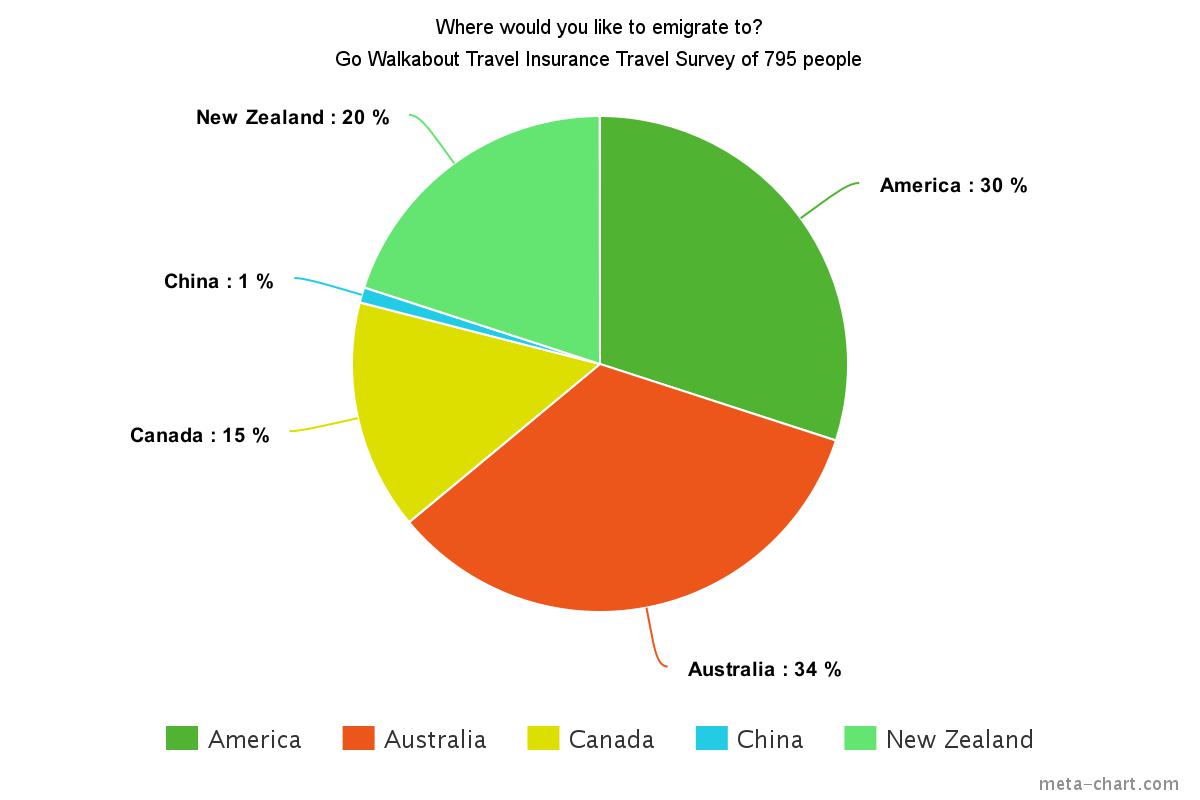
In addition to these main options, there was a diverse range of preferences, including: Scandinavia, the Italian Lakes, Iceland, Scotland, Cuba, Paraguay, Uruguay, Japan, Hawaii, Bhutan, Peru, the Maldives, Tokyo (if I could get there without flying!), Jordan, Egypt, the Galapagos Islands, Antarctica, Costa Rica, French Polynesia, Vietnam, Cambodia, Laos and Burma.
This list just illustrates the extremely diverse range of places that people would love to live. A couple of people responded with sadness: “I’m unable to go abroad due to health” and also “I would have loved to have seen Syria, but obviously not now.”
The clear front-runners in the most-wanted emigration destination are:
Australia 34%
America 30%
New Zealand 20%
It’s interesting to contrast these statistics with a previous data analysis we conducted in October 2015, looking at our Emigration policy statistics. Here is the breakdown of where people were heading:
Australia 45%
New Zealand 16%
America 15%
It’s really interesting to see that although Australia is still the most popular choice of country to emigrate to, America is rapidly gaining in popularity when it comes to choosing a new place to call home. Obviously, the figures from 2015 relate to people who are actually making the big move, as opposed to a certain amount of wishful thinking in the latest figures, but it is interesting nonetheless. Perhaps the reasons cited for why people want to emigrate, could shed some light on why America is seemingly increasing its appeal, and the Australian dream is enduring, but not as dominant as it once was:
Why do you want to emigrate to this country in particular?
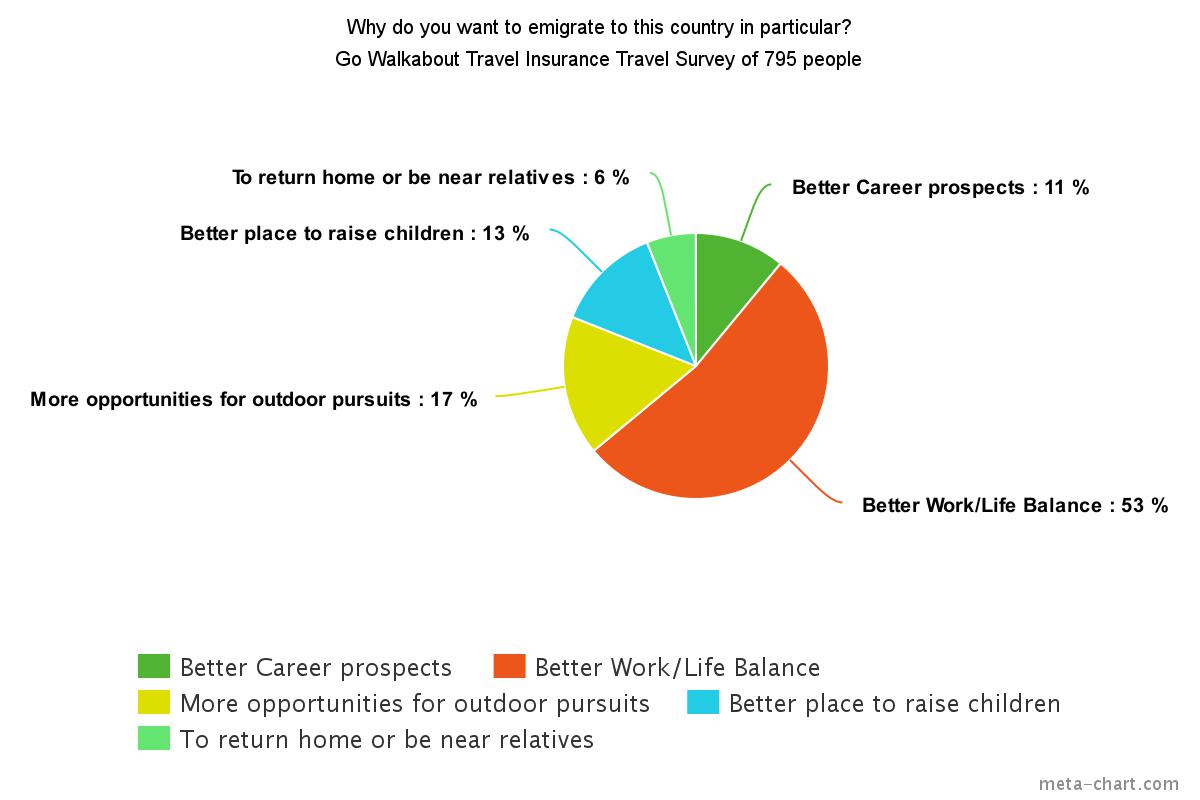
The overwhelming reason that most people cited (53% ) was to attain a better work/life balance.
A look at the working hours directives that exist around the world in 2015 (Working overtime hours across the world: how does the US compare? The Guardian) found that workers in the UK should not work more than 48 hours a week, unless they agree to it. There is no limit on how many hours US workers can work. In Australia, the National employment standards set maximum working hours at 38 hours, but with allowances for overtime and ‘reasonable’ additional hours.
In a ‘Differences in Average Working Hours around the World’ article online from QS Top Universities, the report noted that although there is still the 9-5 culture in Australia, there is more of an opportunity for flexihours, to enable workers to make the most of the great outdoors and surf culture that Australia is famous for, if they want to. By contrast, as there is no legal limit on working hours in the US, workers can find more of a culture to work beyond the “official” expectation.
So it seems that while America may be the land of opportunity in some respects, Australia remains a good bet if you’re hoping to redress the balance between your work and family life, and get to experience a taste of the beach and BBQ culture that the country is famous for. The fact that ‘more opportunities for outdoor pursuits’ is the second most popular reason, also seems to point at the fact that people yearn to leave the office behind at a reasonable time, and enjoy some quality leisure and relaxation time in the great outdoors. Of course, Australia (and parts of the USA) are well able to deliver in terms of climate and sunshine hours, as well as beautiful beaches and outdoor spaces.
This seems to be borne out in the statistics below:
For what reason in particular, would you like to emigrate to Australia?
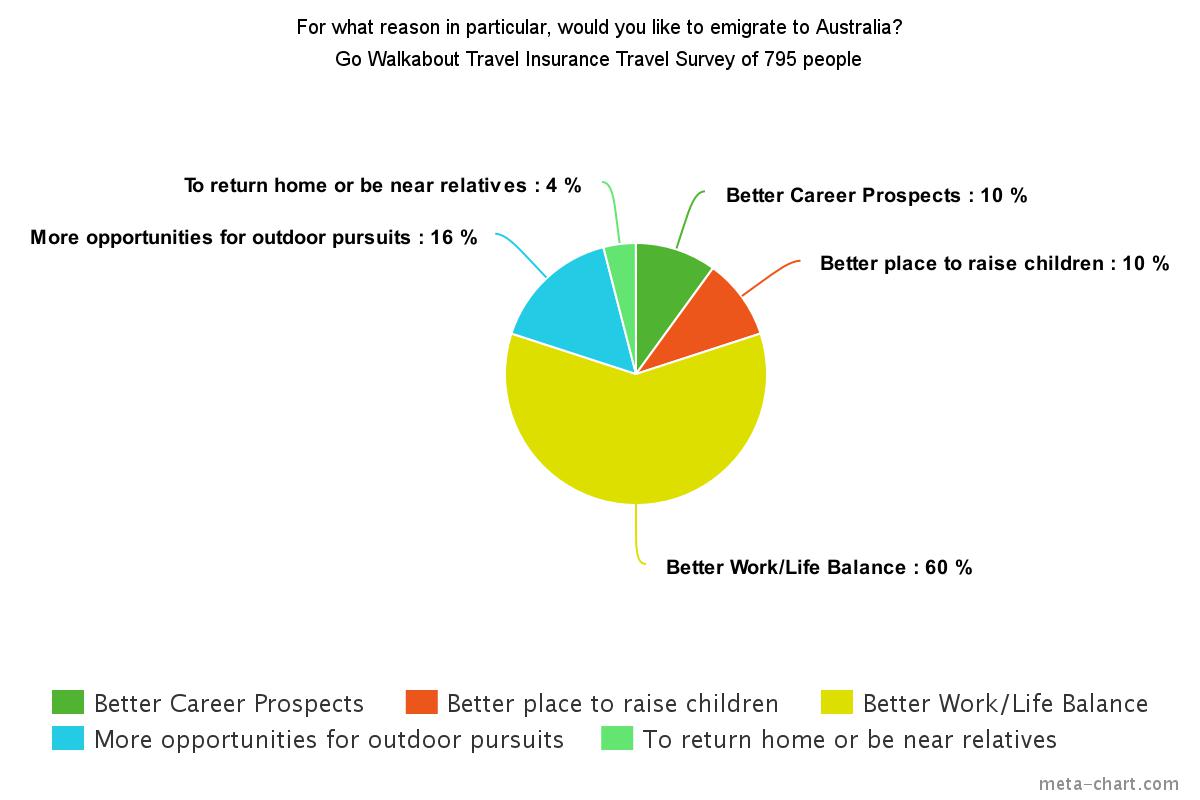
For what reason would you like to emigrate to America?
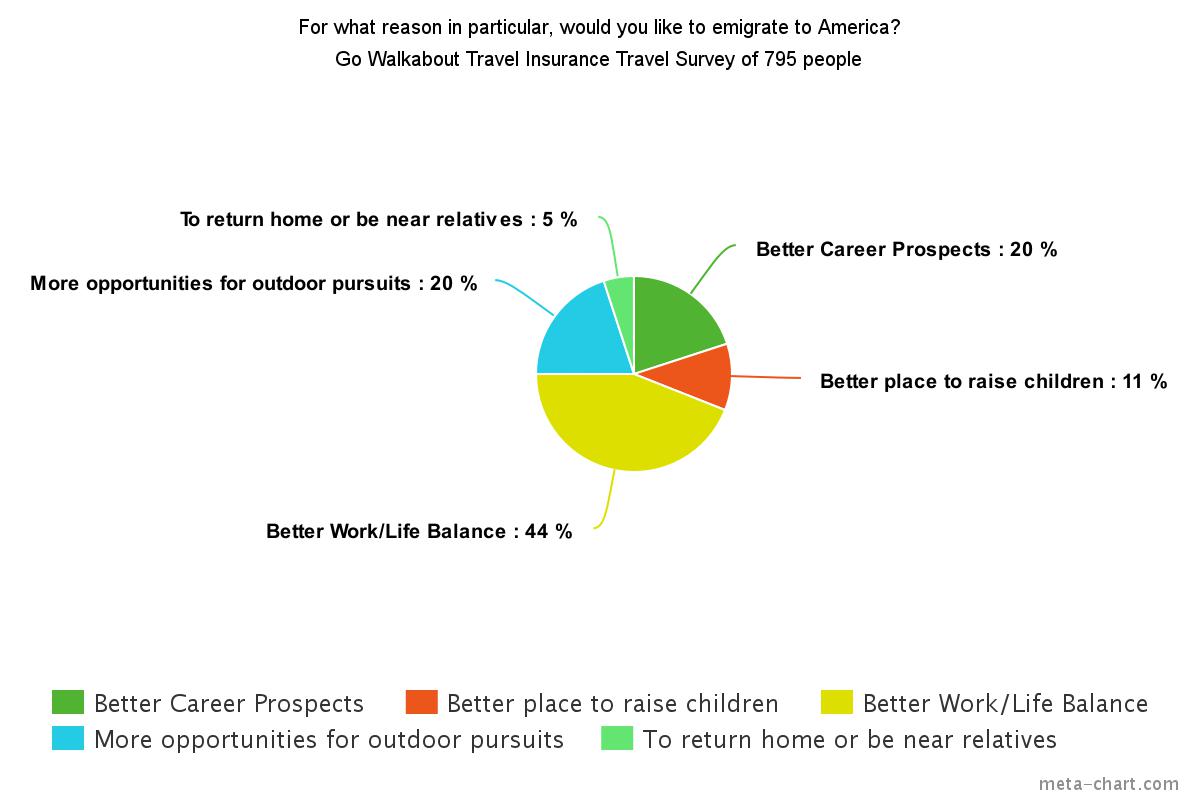
As can be seen from the charts above, the main reason for moving to both America and Australia is for a better work/life balance (although significantly higher for Australia). Double the amount of responses cite ‘better career prospects’ as the primary reason for wanting to relocate to America, as opposed to Australia.
Here are further stats:
Why do people want to emigrate to New Zealand?
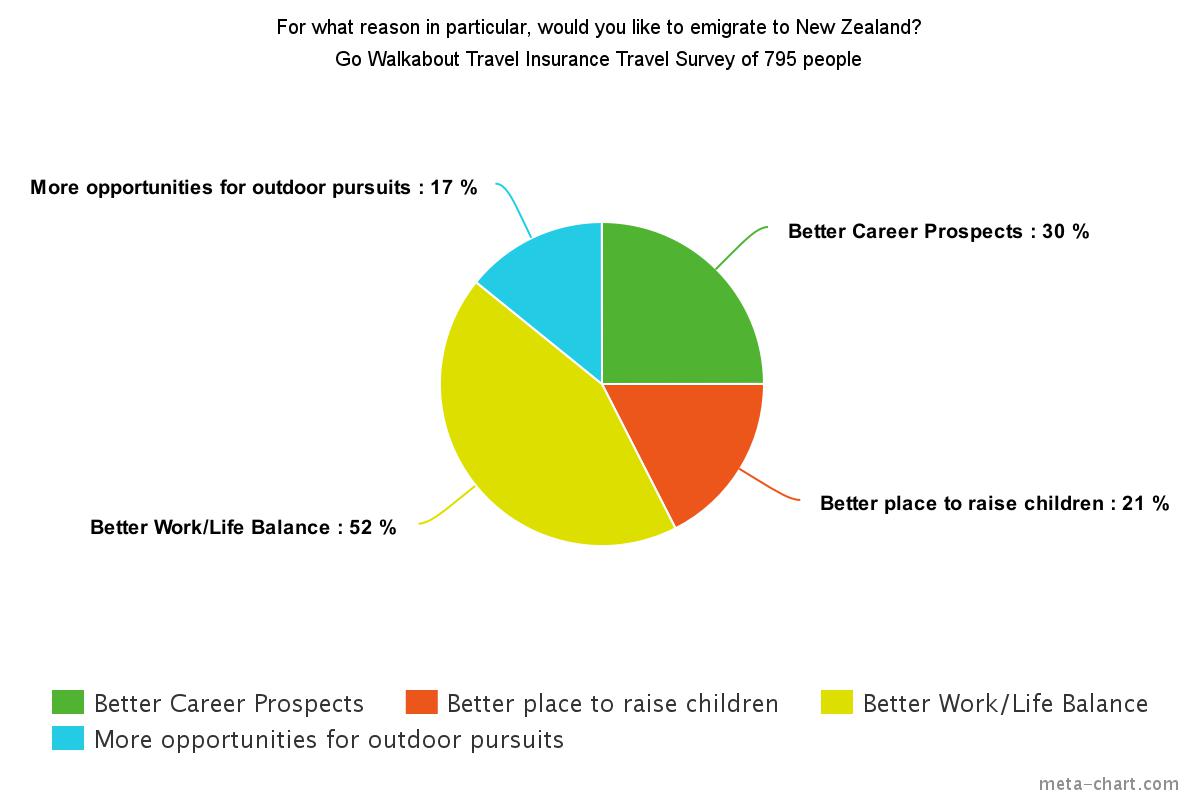
New Zealand is a famously green and laidback land, but it is interesting to note that 30% of people who would choose to emigrate there, are doing so primarily to improve their career prospects, as well as enjoy the beautiful landscape and scenery. Emigrants may find though, that they would be better off staying put in the UK, on that basis, as the latest figures for unemployment in the UK (September 2016) show that unemployment has decreased to 5% (the lowest level since October 2005) and the comparable figures for New Zealand, stand at an increased 5.7% (September 2016)
Why do people want to emigrate to Canada?
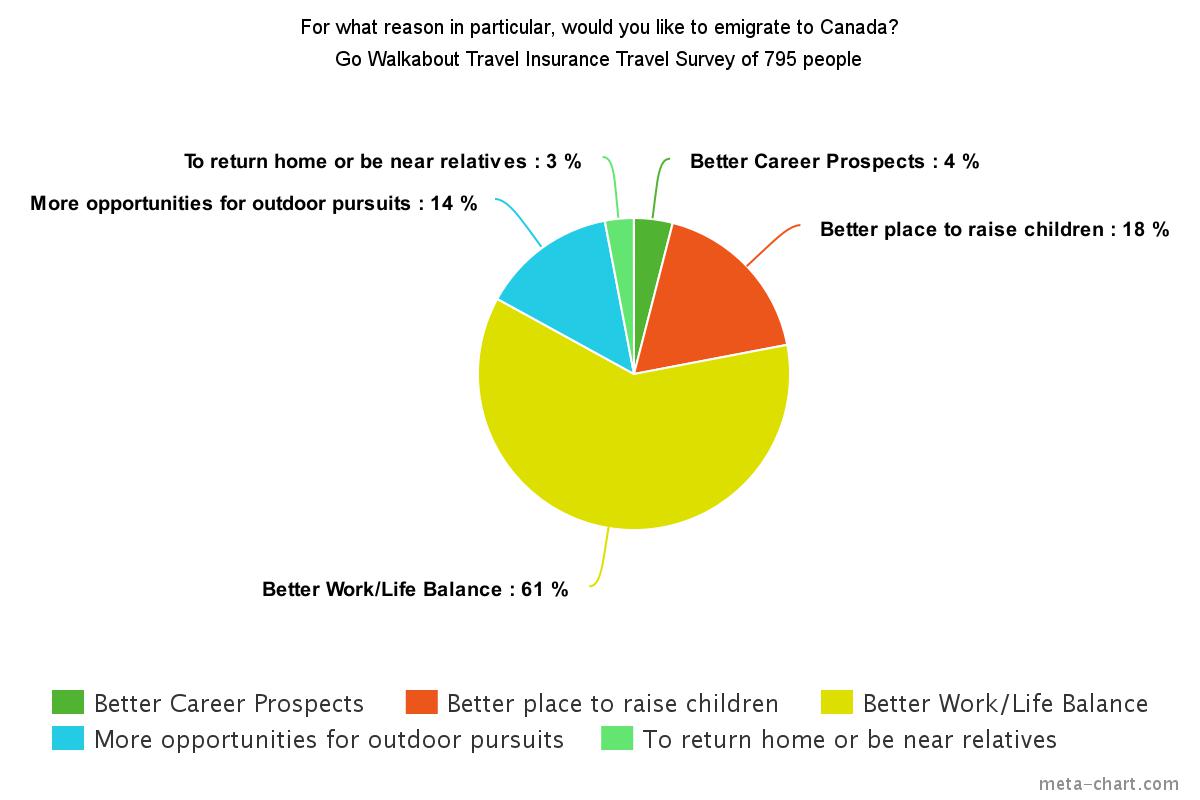
The vast majority of those who would head for Canada, would like to improve their work/life balance (61%) , followed by ‘a better place to raise children’ (18%) A recent survey of expats around the world, showed that Sweden topped the chart as the best country for families to move to (The Telegraph, September 2016) as it offered the best quality of life and improvement in health and wellbeing. Where Canada did rate highly was in its welcome to expats, with over two thirds of respondents saying that the North American Country was friendlier than their home country. Canada ranked highly in the overall ‘best destinations for expats’ list as it came in at number 3 in the rankings, only beaten by Singapore (1st) and New Zealand (2nd).
For what particular reason would you like to emigrate to China?
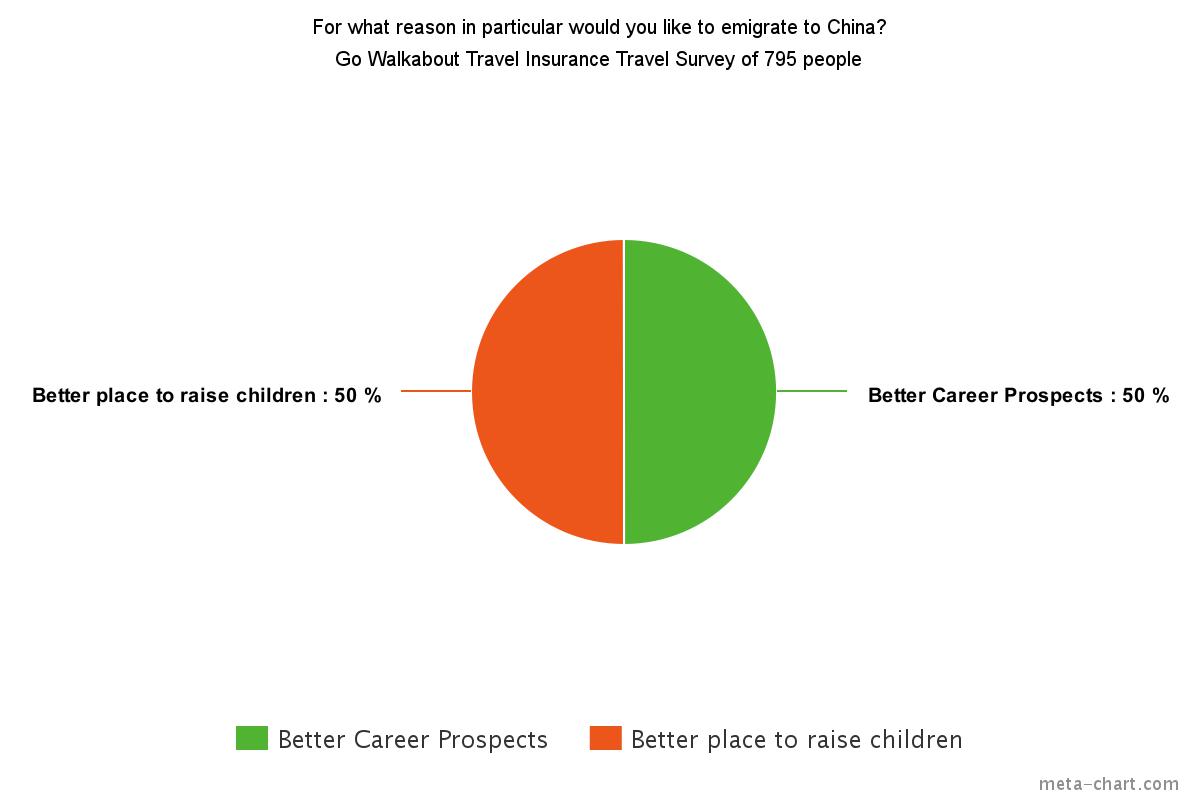
A small proportion of those that we surveyed would choose to go to China, of those that would head there, they were split on their main motivation. China is a communist country with drastically different social and moral conventions, so these may be part of the reason it is not a more popular choice to relocate to. Richard Fowler writes in the Telegraph about his experiences of life after he moved there, in ‘Ten things to know before you move to China’.
It’s also interesting to have a look at whether there are any trends in relation to the ages of people and which particular country they would prefer to call home:
The age groups of people who want to move away from the UK:
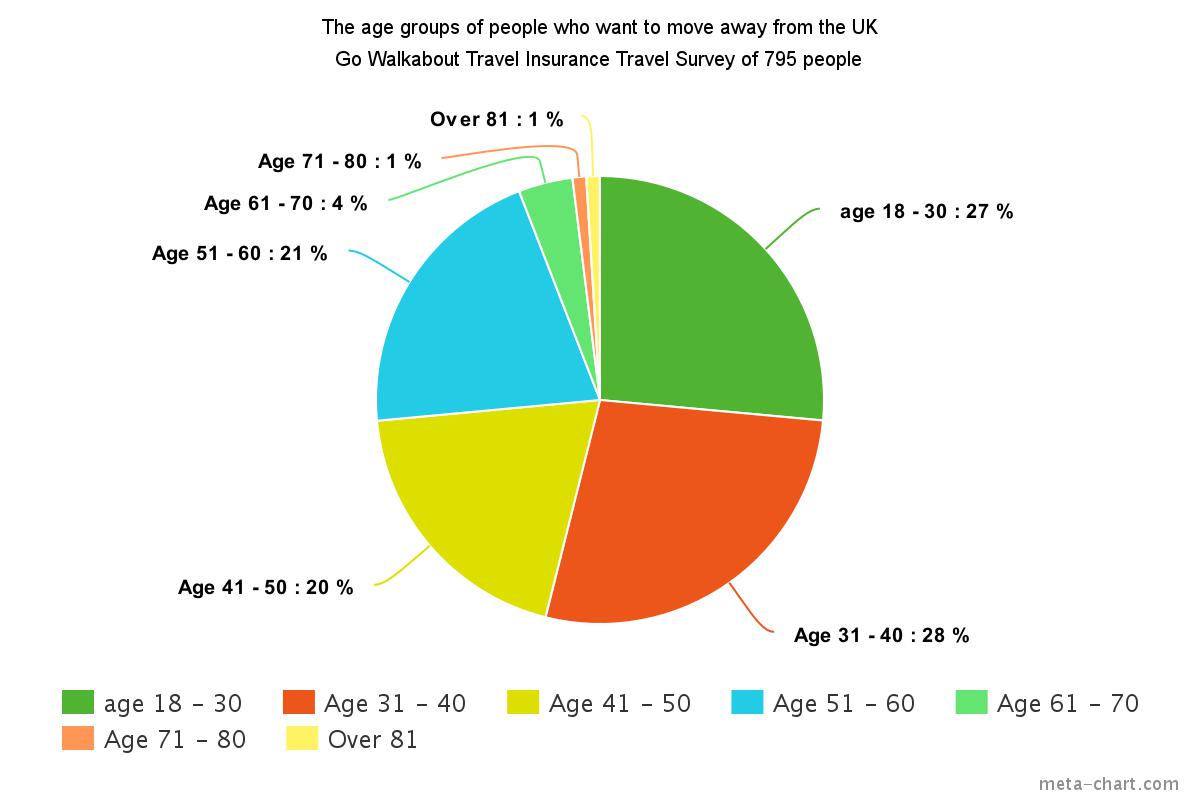
The over- all statistics for all emigration destinations highlighted shows that the majority of want-aways are in the age category of 31 – 40 (28%) but that this is closely followed by those in the age 18 – 30 bracket (27%) This points to the majority of would-be emigrants being economically active, potentially having a family and perhaps wanting to emigrate and enjoy as much time as possible, in a new setting. The proportion of people wanting to emigrate in the older age categories does significantly diminish after the age of 60, but there are still those who want to emigrate in their 60’s, 70’s and even their 80’s, either to enjoy their retirement or to relocate and spend time with family that have already made the move, perhaps. We’ve taken a look at the ages who want to emigrate to each country in particular:
What are the ages of people who want to emigrate to Australia?
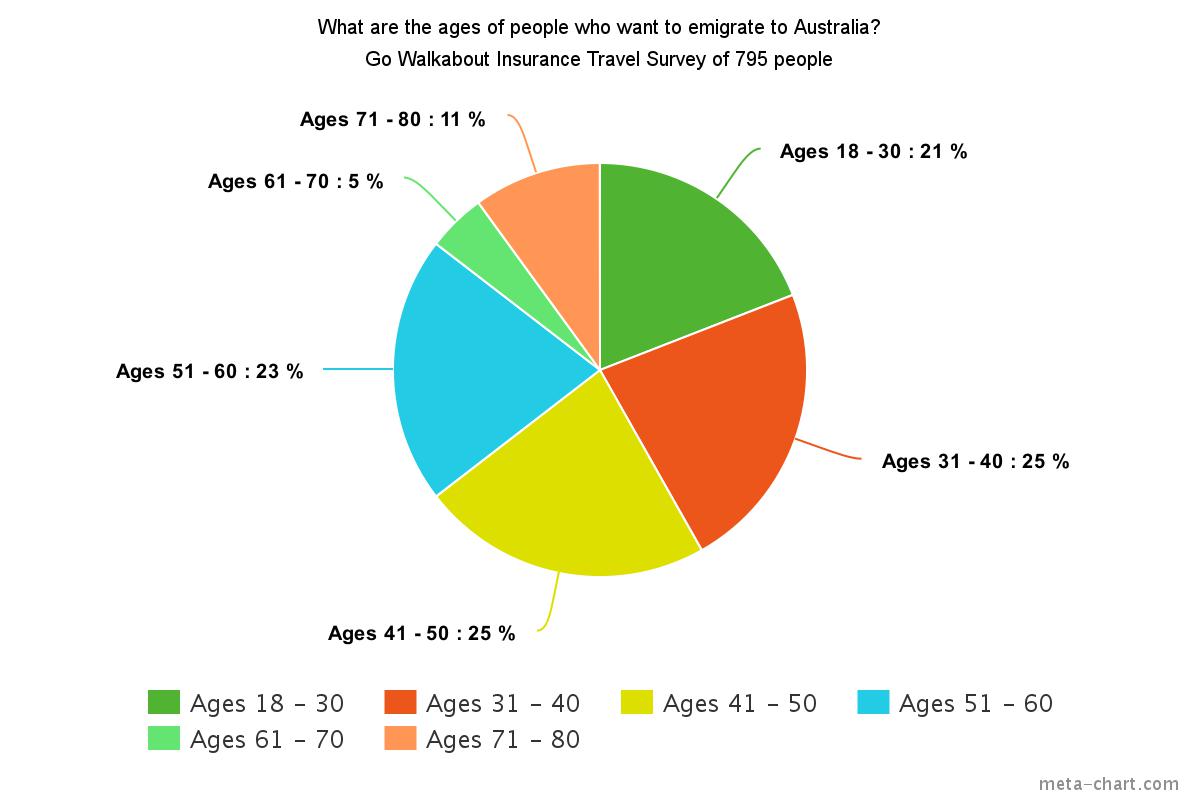
As you can see from the chart above, there is a tie between the age categories of 31 – 40 and 41 – 50 (25% respectively) of all of the people who would like to move to Australia. This is closely followed by those in the age bracket of 51 – 60 (23%) . Interestingly, there is a higher percentage of people in the age category of 71 – 80 (11%), than in the younger age category of ages 61 – 70 (5%). This is a curious anomaly, perhaps this is because people are working for longer until they retire nowadays, and those in the age 61 – 70 category are still working and not yet looking for their dream location to spend their well-earned retirement, in the sun. Of course, the eligibility of people in different age categories to move to Australia, is down to the current emigration policy and points-system in place at the time, and may affect people’s desire to move to a certain location.
What are the ages of people who want to emigrate to America?
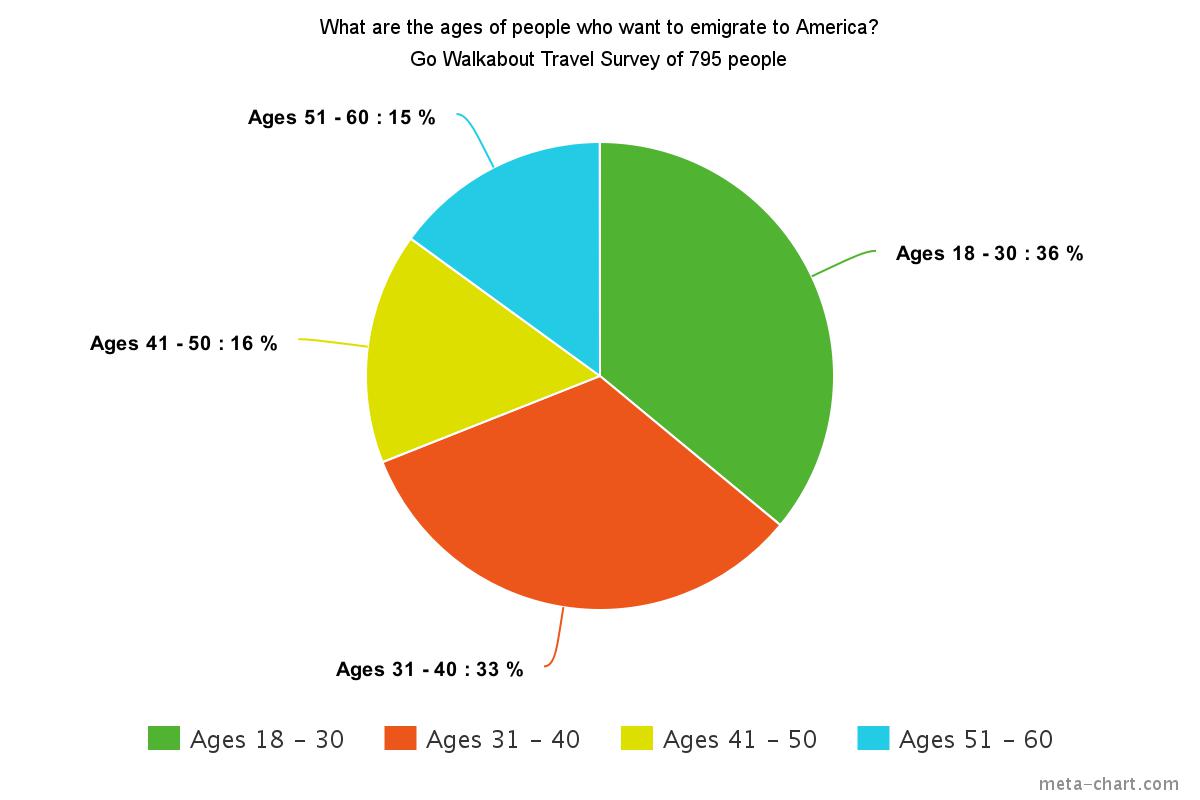
Interestingly, there was no-one over the age of 60 amongst the 795 people surveyed, who would choose to emigrate to America. As the main reason people chose to go there in particular was to have a ‘better work/life balance’, this could point to one of the reasons why people who’ve retired wouldn’t necessarily choose to move there. Another factor might well be that medical costs are notoriously expensive in the USA, and although this is playing to a stereotype, older people with an increased chance of having a pre-existing medical condition, may well worry about moving there, and exposing themselves to expensive medical bills, and the ongoing costs of private health insurance.
What are the ages of people who want to emigrate to Canada?
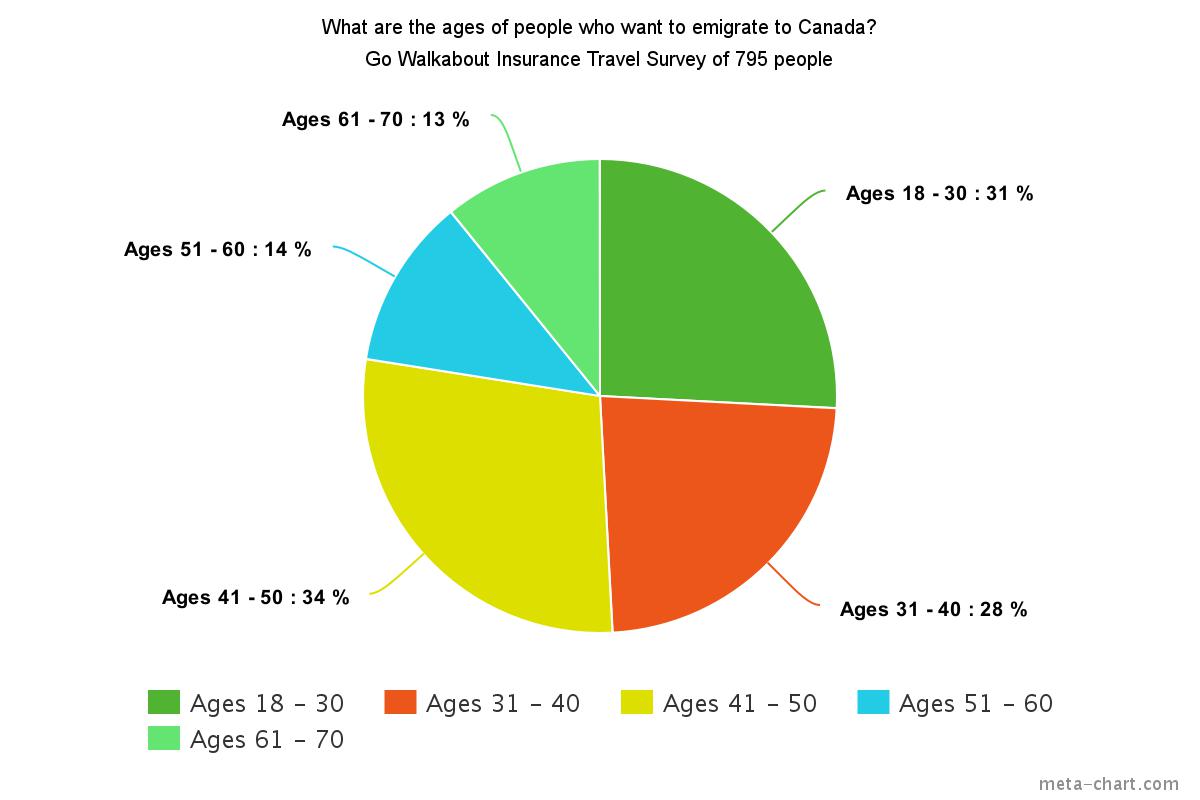
Interestingly, 61% of those that preferred Canada as their emigration destination of choice, were between the ages of 41 and 70. The majority of those who would like to head there, cited a ‘better work/life balance’ (61%) as their main motivation. Perhaps, this also includes those who want to drastically change their work/life ratio, by actually retiring in Canada, and spending their later years in the great outdoors that the country has to offer.
What are the ages of people who want to emigrate to New Zealand?
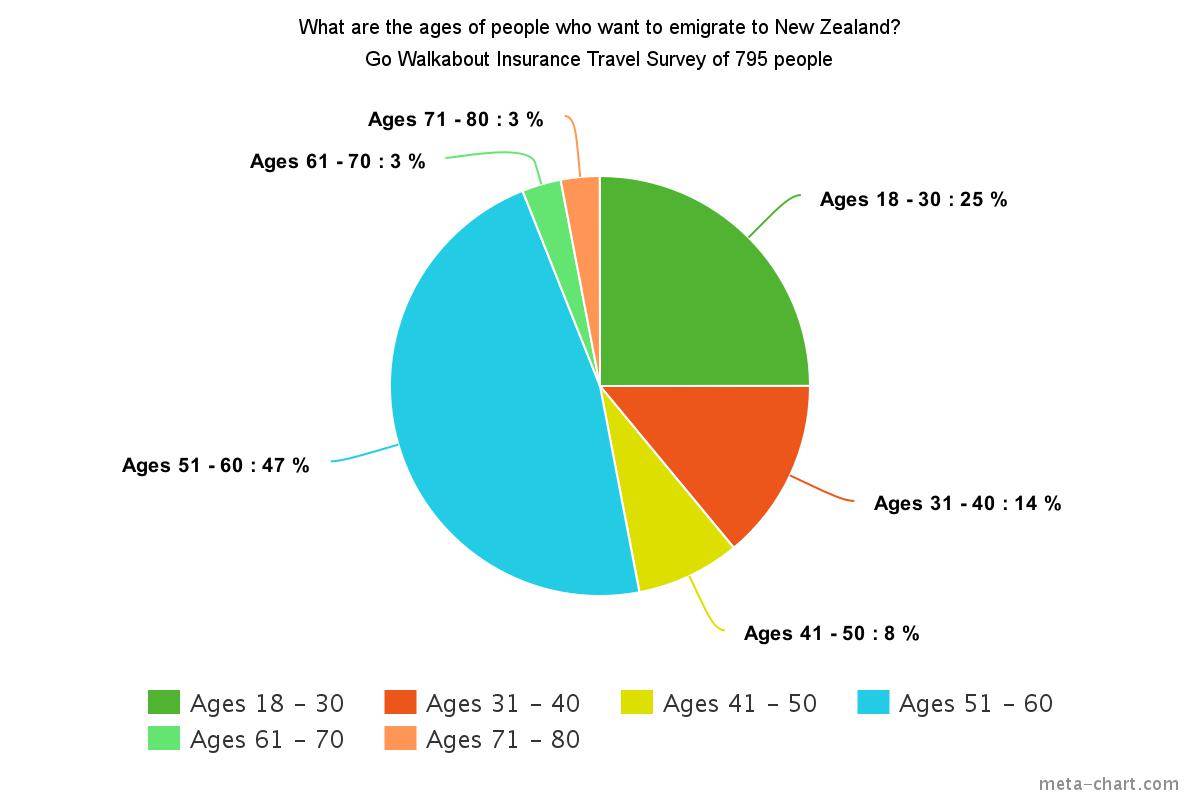
As you can see from the graph above, the majority of those who’d most like to emigrate to New Zealand, are within the age category of 51 – 60. New Zealand has many traditions and common cultural ties in common with the UK, but is also less crowded than the UK. It’s also well-known for having a very generous pension scheme for older people, which would obviously help to enjoy all that life has to offer in this green and pleasant land. You can find out more in ‘Retiring to New Zealand: what you need to know’ (The Telegraph, November 2014)
It’s obviously important if you’re seriously considering transplanting your whole life to another country, to do some serious research before you go, and ideally, visit the country that you would like to call home. You need to have a serious think about your personal priorities and circumstances, when making the momentous decision about where to head for. It could be the case that you’ve been on holiday somewhere, or have heard about all of the good things about a certain destination. It’s important to really look at things in detail, including your finances, accommodation, employment options and schooling. A good place to start is the HSBC annual Expat Survey which has surveyed thousands of expats around the world and asked them to rate several aspects of their new life in their new country. Take a look at the 2016 results here.
Once you’ve decided where you’re heading off to, and made all of the necessary arrangements, make sure that you include one-way travel insurance as a priority before you actually head away from the UK.
A standard single-trip travel insurance policy wouldn’t be valid, as the terms of the policy require you to be returning to the UK by the policy end date. Taking out one of our specialist one-way emigration policies offers invaluable cover before you travel, whilst you travel en route to your final destination, and also for a period of up to 31 days once you get there.
Here are just some of the benefits of our most comprehensive Emigration Gold policy:
- £3000 for trip cancellation
- Up to £1, 500 for your personal belongings
- £250 for your personal money
- £250 for your travel documents
- £10, 000, 000 for Emergency Medical Expenses
You can take a look at the benefits of both the Emigration Gold and Silver policies here and get a quote for your emigration journey here.
Please note that the policy benefits mentioned, are correct at the time of publishing this article, but please check our website for current terms.

Related posts
We’re all going on a working holiday!
12 July 2012Read more
Places to Visit | Travel NewsLondon is the most highly-rated city destination
30 July 2012Read more
Misc | Special EventsA Travel Insurance Policy for Father Christmas
3 December 2012Read more
CompetitionsHidden Gems Travel Competition Entries
7 March 2013Read more